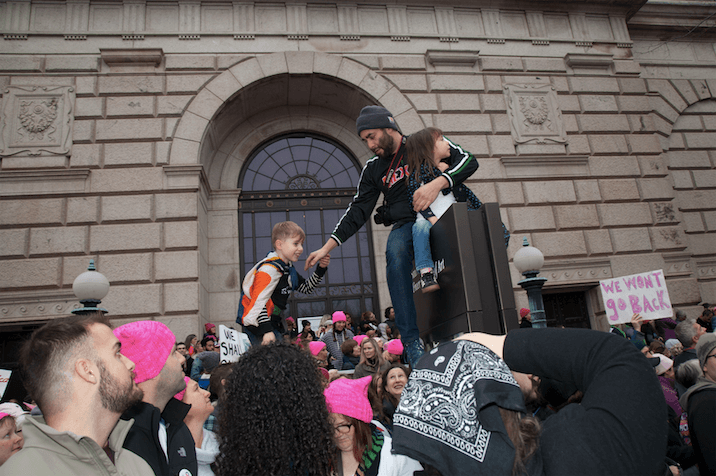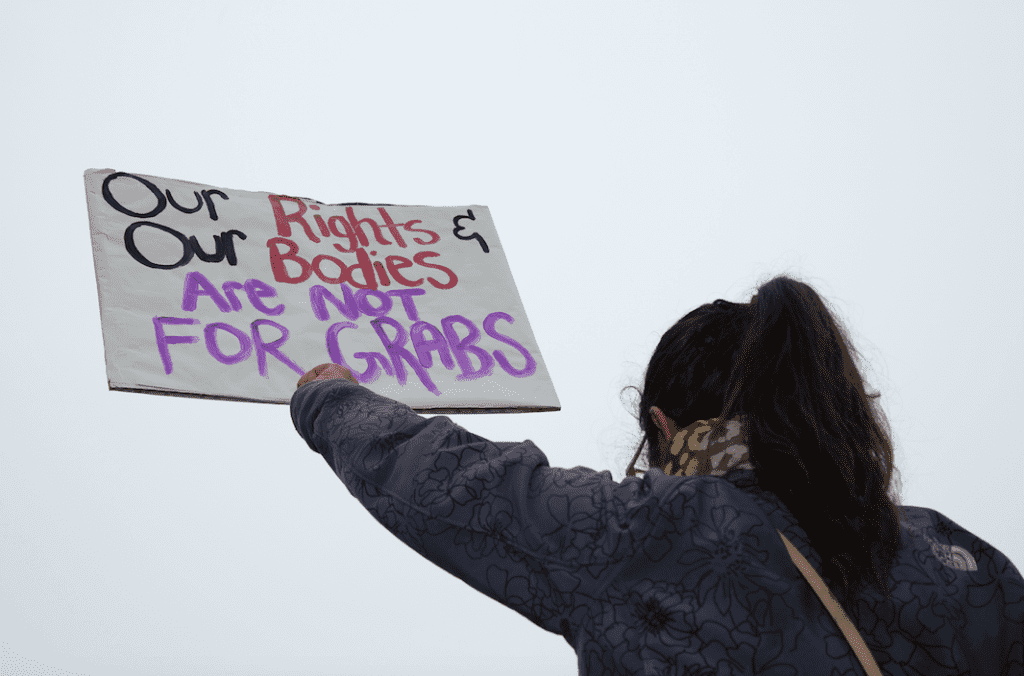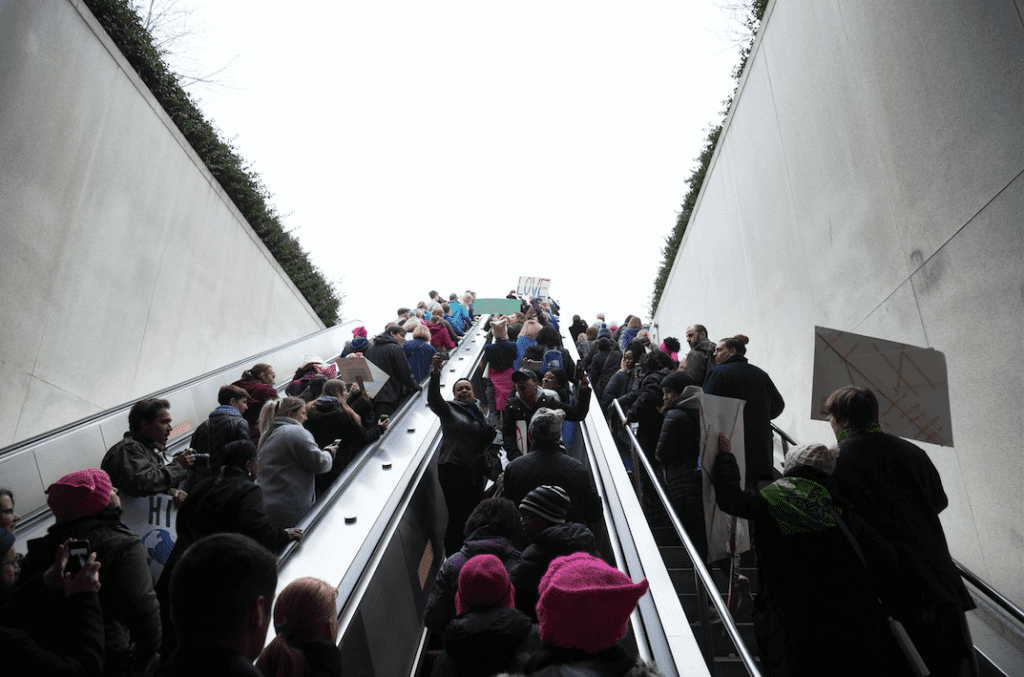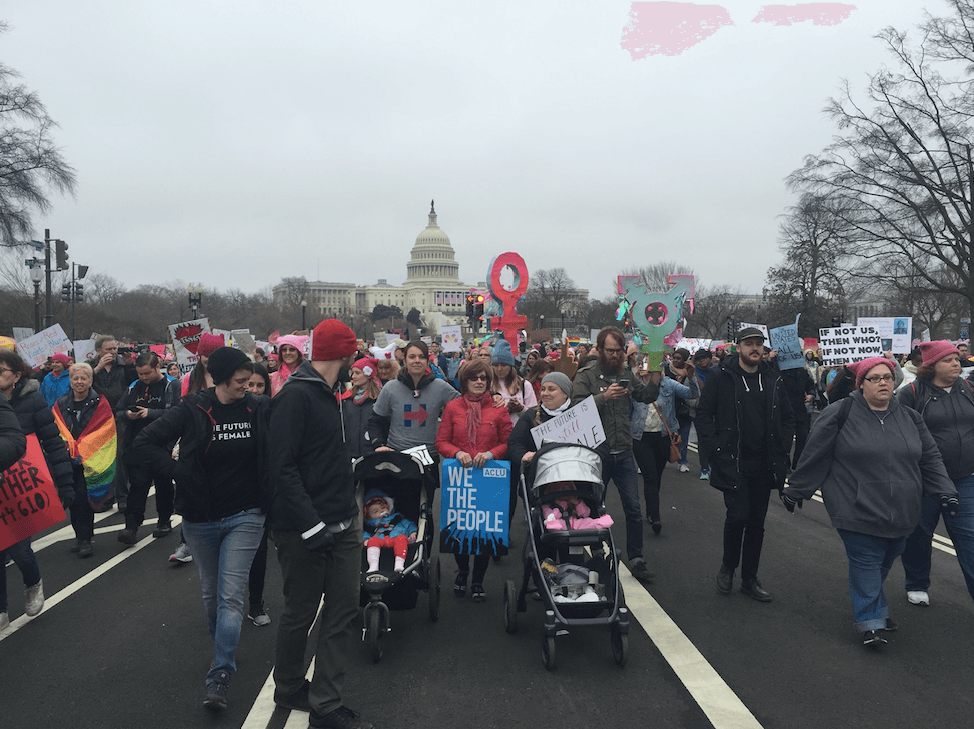Out of Bleakness, Hope: The Women’s March on Washington DC
Other than this weekend, to my recollection, I have cried only five times in my life due to politics, and three of them were during the last election cycle. That is not because I tend toward the emotionless (quite the opposite), but because I have led a privileged life. I’m from the midwest, I have a supportive family, I am white, I went to college, the end. When we have no visceral sense of what we—and our community—have to gain or lose, we have no overwhelming reason to cry.
The first time I did cry was in 2011. New York State became the largest to allow same-sex marriage, thereby giving the movement for marriage equality across the country renewed inertia. I was in grad school, out of the country that summer, and watched a video about the first gay couple, Connie Kopelov and Phyllis Siegel, legally married at City Hall. It was a long-delayed public righting of a long-standing public wrong that, directly or indirectly, we all had allowed. Witnessing this official act of justice radiated an overwhelming bigness, a sense of communal healing, that only acts of acceptance can.


The second time came from another video: President Obama singing Amazing Grace at the end of his eulogy for Reverend Clementa Pinkney, after the massacre in Charleston, South Carolina. It was another act of healing (inspired, he said, by the victims’s own family members, who had unthinkably forgiven the white supremacist murderer in court). Look at this force! President Obama showed us. Look how this deceptive softness—a focus on love and goodness—eviscerates any kind of retaliation in kind. It was a stunning thing to witness; a peek into the boundless potential that similarly big-minded but gentle actions could bring to us all.
The remaining times piled up at the end of 2016: Watching Hillary Clinton, the first woman in United States history, accept the democratic nomination for president, I (in a surprise moment, even to myself), lost it. To see her stand behind a podium and give her speech, in the near highest-achievable position of power in the country, woke me up inside like a shot of grappa that burned as it went down. Never before had I seen so clearly how I had implicitly limited my own expectations for myself, my entire life, because I was female. Watching her there, ignoring every fake boundary we’ve ever been taught to see, I saw, too, how false they were. She had ascended to this position not by playing the low games of every misogynist who ever tried to hold her back, but through unrelentingly and high-mindedly pushing forward. It felt personal, yes, but it was so much more powerful than that because it was a victory shared by every woman.


Election day brought about the fourth and fifth: Inside of a public school gymnasium in Brooklyn I cried as I approached the booth to cast my vote for a woman president; and several hours later, I cried during the horrifying moments it became clear who would win. The bumbling white male who bragged about grabbing pussies, whose policies would reduce the rights of women, minorities, and foreigners, under the law, would be president. Suffice it to say, my sadness over this loss felt personal, but also exponentially bigger; it was a loss not only for America, but for the human race. I bawled in front of Brian Williams’s face for a while, stunned. Would all those moments of collective healing, and breakthrough, and acceptance, now evaporate?
In preparation for the Women’s march in Washington DC this weekend, I was less than excited to confront the city where the newly-sworn-in president lived, a place that now symbolized those opposite forces of ignorance and fear and hate that, in part, boosted him into office. The six-hour-long bus ride to Washington DC felt like a long and drawn out slog whose end point was the epicenter of a sickness. Images of rioting and looting flashed across our screens, and there were instructions for what emergency items to bring with us, and what to have scrawled on our arms in permanent marker, in the event that someone got separated from the pack, or something not very good happened.
Nonetheless, the morning after traveling there, I took the metro with one of my oldest girlfriends to the National Mall, even as I felt unconvinced the effort would matter—that the mere congregation of like-minded bodies, in protest of something already done, could create and energize a new movement, or, unthinkably, incite change.


Well, if I had all too quickly forgotten the power that lies in peaceful but energetic action in the face of injustice, I re-remembered quickly on Saturday morning, stuck deep in a pack of pink pussy-hat wearers, and sign wielders, waiting to filter out of the Judiciary Square metro station near the Mall. As we moved in a mass, slowing approaching the escalators, I heard a single voice in the crowd shout Obama’s “Fired Up!” call; within moments the entire station was raucously responding, “Ready to Go!” Our cause, suddenly, felt as alive and dynamic and inspiring as any flat piece of legislation ever could. Tears burst from my eyes as if in celebration (and in wistful remembrance of our dearly departed leader, of course).
Getting to the point where any of us could march—due to the sheer density of the crowd—took some time. To hear that the march amassed record numbers of Trump protestors (without a single arrest!) is one thing; to be in the midst of them was another feeling all together. From the moment we began, a collective and enormous euphoria rose above and permeated the pack—through thumbs up given to other people’s signs; through acknowledging smiles given to every person who walked beside you; through a collective acceptance of every single person you saw, no matter what, because they were there—all of it gave me a brand new belief in the inherent power of showing up. President Obama was right: as he said in his farewell speech in Chicago, the fight for what is right does not occur among elected officials only; it must belong to every single one of us, every day. This fight, more than half a million people, unified in a single peaceful march for equal rights, was the fight that mattered now.
Yes, Obama is out of office. Clinton lost. But on Saturday, their legacy was reborn, and grew, stretching over every single presence on those streets. A few days earlier, I had listened to Obama’s final words in office as if they came from a dead man walking. This was proof that that sadness was wrong. The fight was not dead; the fight had only just begun in all of us there together.


Images by Natalia Moena; last image by Natalie Rinn
You might also like 




















